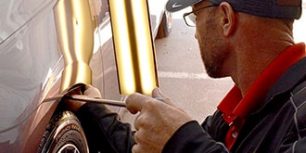Reconditioning is an important strategy for dealerships. How you handle reconditioning can make or break your dealership’s efficiency and profitability.
Some dealers build their own reconditioning teams with dedicated technicians and service bays. Others farm out specialized work to vendors who handle things like paintless dent repair (PDR), wheel refinishing, or upholstery work.
The real question isn’t whether to recondition—it’s figuring out the best process to get it done fast and for the right price.
Let’s look at this through four angles: controlling costs, maintaining quality, keeping things moving, and using your people effectively.
Auto Reconditioning Cost Control: What You’re Really Paying
When you handle auto reconditioning in-house, you control the labor costs, but you’re also taking on a lot more than just wages—training costs, equipment purchases, tool maintenance, supplies—and you’re tying up service bays that could be turning customer-paid work. Reconditioning costs are a key factor in the overall expense for a dealership, and managing them effectively can impact your profitability.
Reconditioning in-house works great when your reconditioning volume stays steady and you can keep your dedicated guys busy year-round. But most dealers see big swings in inventory and reconditioning work throughout the year.
Outsourcing the work flips those fixed costs into something that you pay for when you need it. This makes more sense for specialized repairs (wheels, PDR, etc.) or when you get slammed with inventory or hail damage and your regular crew is already maxed out.
Plus, you don’t get stuck paying for guys sitting around during slow periods, and you don’t have to invest in training or specialized equipment for work you only do occasionally. Controlling reconditioning costs can improve ROI and help dealerships save money in the long run.
Quality: Jacks-of-All-Trades vs. Reconditioning Services Specialists
Your in-house team handles all kinds of work, but some repairs really need someone who does them all day, every day.
Take PDR—screw it up and you’re looking at bodywork and paint repair. Upholstery repairs and wheel work need specific materials, tools, and a good eye for color matching and scratches.
The vendors that do these repairs have the right tools, materials, and experience. They do these repairs dozens of times a week, meaning better results and fewer comebacks.
And here’s the thing—poor reconditioning work shows on the lot. Customers notice sloppy repairs, and that affects how long cars sit before they sell.
Speed: Keeping Cars Moving with Auto Reconditioning
Long reconditioning times kill your inventory turns. When your service team is juggling customer cars and reconditioning work, guess which one gets pushed to the back burner?
Outsourcing the time-consuming stuff can speed things up significantly. Some vendors even work mobile—they come to you and knock out the work the same day.
Faster reconditioning means more cars on the lot and better cash flow.
Staff Utilization: Playing to Your Strengths
Your top technicians should be doing the high-cost work—diagnostics, bigger repairs, and warranty jobs for example.
When they’re spending time on cosmetic touch-ups or basic reconditioning tasks, you’re not getting the most bang for your buck. Those service bays could be turning customer work that generates better margins.
Outsourcing the work frees up your skilled guys to focus where they make you the most money. This creates an opportunity for better staff utilization and provides a solution for maximizing dealership profitability.
What Can Go Wrong
Outsourcing isn’t all upside.
You’re relying on third-party vendors to get your vehicles frontline-ready, and if they miss a deadline, cut corners, or don’t show up, your entire reconditioning process backs up. The wrong partner can cost you time, money, and credibility.
Tracking is another potential pain point. If multiple vendors are working on different vehicles — dents, wheels, upholstery— you need clear systems to track where each unit is in the process. Otherwise, you’ll spend more time chasing updates than moving metal.
Don’t overlook compliance, either. Make sure your vendors have proper procedures and paperwork in place, especially for services involving paint, chemicals, or mobile repairs. You want to be confident they’re not putting your operation at risk.
That’s why vendor reliability is non-negotiable. You need a partner, like Dent Wizard, who shows up when they say they will, do consistent quality work safely, and can scale with your volume. During peak times even the best vendors get booked up fast, so having backup plans or secondary vendors is key.
Making It Work
Getting vehicles from the back lot to the front line for sale as efficiently as possible—without cutting corners on quality—is what separates average operations from high-performing ones.
From PDR and wheel refinishing to interior upholstery repairs Dent Wizard specializes in the kinds of auto reconditioning work that can slow dealerships down if handled in-house. Dent Wizard helps restore vehicles to like-new condition, maximizing vehicle value and enhancing their lot appeal.
We are a national provider trusted by dealerships across the country. They rely on us for high-quality reconditioning services, so whether you need work done on the lot or off-site, Dent Wizard delivers scalable support, quick turnaround times, and professional results that meet the standards of today’s buyers. We can help you move vehicles faster, protect your margins, and maintain a strong return on your reconditioning investment, keeping your lot frontline-ready.
Stop letting slow reconditioning kill your inventory turns. Dent Wizard helps dealerships move vehicles faster—safely, professionally, and at scale.





